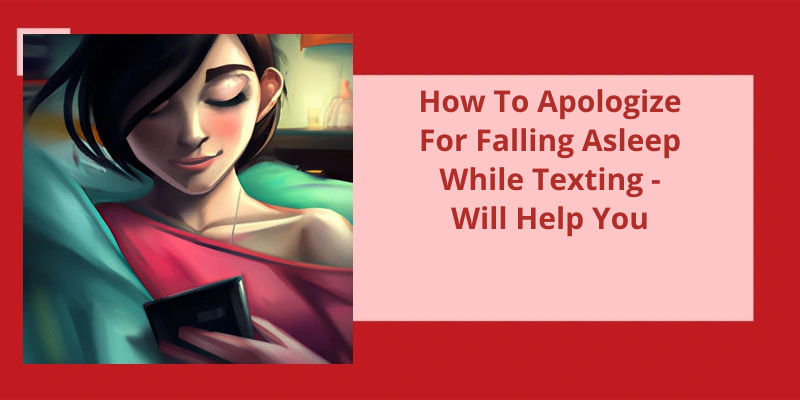In today's fast-paced world of technology and constant communication, it's not uncommon for us to find ourselves engaged in late-night texting conversations with friends, loved ones, or colleagues. But what if you unintentionally fall asleep in the middle of one of these conversations? Suddenly, you wake up to a plethora of unanswered messages, leaving the other person feeling ignored and possibly even hurt. While it may seem like a small mistake, it's important to acknowledge the impact it can have on your relationship and take the necessary steps to apologize. A simple "Hello, I'm sorry" and explanation of why you fell asleep can go a long way in showing your remorse and understanding. However, if you truly want to convey your sincerity, consider having a face-to-face conversation where your remorse can be more clearly observed. This blog post will guide you on how to effectively apologize for falling asleep while texting and provide helpful tips to salvage the relationship affected by this misstep. So, let's delve into the art of apologizing and discover the best approach to ensure your apology is heartfelt and accepted graciously, helping you make amends and rebuild trust.
How Do You Respond to I Fell Asleep Text?
When faced with an “I fell asleep” text, it’s important to respond with understanding and empathy. Begin by apologizing for keeping them awake with your texting past their usual bedtime. Acknowledge that your actions may have contributed to their fatigue and assure them that it was not intentional.
Next, express genuine concern for their well-being and emphasize the importance of getting sufficient sleep. Let them know that you understand the significance of rest and that you want them to prioritize their own health and well-being. This shows that you care about their needs and are willing to take responsibility for any inconvenience caused.
It’s also essential to assure the person that your ego can handle the situation. Let them know that there’s no need for them to feel guilty or obligated to have stayed awake. Remind them that demanding someones attention at all times is rude and that you’re understanding of their decision to prioritize their sleep. By doing so, you demonstrate a level of maturity and understanding that can help ease any potential tension or discomfort caused by the situation.
In essence, responding to an “I fell asleep” text with a sincere apology, concern for their well-being, and an understanding of their need for rest illustrates your respect for them as an individual. It encourages open communication and sets a healthy boundary for future interactions. Remember, acknowledging and taking responsibility for your actions is an important aspect of maintaining healthy relationships.
It’s important to apologize if you unintentionally fell asleep while texting a girl. However, to avoid such situations in the future, consider communicating with her beforehand and letting her know if you’re about to go to sleep. By being transparent and considerate, you can ensure better understanding and avoid any potential misunderstandings.
Should I Say Sorry to a Girl if I Fall Asleep While Texting?
When it comes to falling asleep while texting, it’s important to prioritize open communication and respect in any relationship. While it’s understandable that you may unintentionally fall asleep and not respond to messages, it’s always a good idea to apologize for any inconvenience caused. Taking responsibility for your actions and showing empathy towards the other persons feelings is a key element in maintaining a healthy relationship.
By apologizing, you’re acknowledging that you understand the impact of your actions and that you recognize the inconvenience it may have caused. It demonstrates maturity and respect towards the other person, allowing for open dialogue and the chance to make amends. Whether you were having a deep conversation or simply engaging in lighthearted banter, showing remorse for falling asleep portrays your dedication to the relationship and your desire to be considerate of the other persons needs.
However, to avoid such situations in the future, it would be beneficial to establish clear boundaries and communicate openly with the person you’re texting. If you anticipate that you may fall asleep, it’s proactive to send a message before doing so, politely informing them of your impending slumber and suggesting that you resume the conversation the following day. This allows for understanding and eliminates any potential confusion or disappointment.
Additionally, to mitigate any future occurrences, consider texting them beforehand, informing them of your imminent sleep and suggesting that you continue the conversation the next day. By prioritizing open communication and displaying sensitivity towards the other persons needs, you lay a foundation for a healthier and more understanding relationship.
The Importance of Setting Boundaries in Texting Relationships: This Topic Could Delve Into the Necessity of Establishing Clear Expectations and Boundaries When It Comes to Communication, Including Discussing Sleep Schedules and the Potential for Falling Asleep While Texting.
In any texting relationship, it’s crucial to establish clear boundaries and expectations. This includes discussing sleep schedules and the possibility of accidentally falling asleep while texting. Setting these boundaries can help both parties understand each other’s limitations and avoid any misunderstandings or hurt feelings. By openly communicating about sleep habits and discussing how to apologize if one falls asleep during a conversation, potential issues can be addressed and resolved more easily. Ultimately, setting boundaries in texting relationships can foster trust, respect, and mutual understanding.
Sleep texting, although not typically an alarming issue, can still be a nuisance. However, there are some easy methods to prevent it. By disabling notifications, powering down your phone, or keeping it away from your bedroom, you can effectively curb this sleep-related behavior.
How Do I Stop Sleep Texting?
Sleep texting can be a frustrating and embarrassing habit, but fortunately it isn’t usually a serious problem. There are several simple steps you can take to prevent sleep texting and avoid any potential misunderstandings or apologies. One effective method is to turn off your phones notifications before you go to bed. By disabling these alerts, you can minimize the chances of being woken up by incoming messages and subsequently responding unconsciously.
By creating a habit of disconnecting from your phone before bedtime, you can reduce the chances of engaging in unintentional conversations while asleep.
In addition to these preventive measures, it may also help to establish a consistent bedtime routine. By prioritizing a wind-down period before sleep, you can train your body and mind to relax and prepare for restful sleep. This routine can include activities such as reading a book, meditating, or taking a warm bath, which can all contribute to a more peaceful and uninterrupted slumber.
They can provide further guidance and explore potential underlying causes that may be contributing to this behavior. Remember, addressing sleep texting is about finding the strategies that work best for you and prioritizing your own well-being.
The Psychological and Physiological Effects of Sleep Texting
Sleep texting refers to the act of sending texts while asleep or in a semi-conscious state during the night. This phenomenon can have both psychological and physiological effects on individuals.
Psychologically, sleep texting can lead to feelings of embarrassment, guilt, or confusion upon realizing what’s been sent while being unaware of it at the time. It may also cause anxiety and stress about potential negative repercussions of the messages that were sent while asleep.
Physiologically, sleep texting disrupts the natural sleep cycle, which can result in poor sleep quality and daytime sleepiness. Continuous interruption of sleep can lead to fatigue, decreased cognitive function, and difficulties in concentration and memory retention.
To apologize for falling asleep while texting, it’s best to acknowledge the mistake, express genuine remorse, and offer an explanation for the behavior. Taking responsibility, listening to the other person’s feelings, and making efforts to prevent it from happening again are important steps in making a sincere apology.
Overall, sleep texting can have both psychological and physiological consequences, reminding us of the importance of maintaining a healthy sleep routine and being mindful of our behaviors, even while asleep.
Nowadays, it’s not uncommon to find ourselves constantly glued to our smartphones. From texts to social media notifications, the urge to stay connected is strong. However, this habitual behavior may sometimes seep into our sleep, leading to a phenomenon known as sleep texting.
Is It Normal to Text in Your Sleep?
Sleep texting is a phenomenon that’s become increasingly common in our digitally-driven society. With phones serving as constant companions, it’s not surprising that they can infiltrate our subconscious even in our sleep. So, is it normal to text in your sleep? Well, it’s not entirely abnormal. Our brains are wired to respond to stimuli even when were asleep, and the constant buzzing of notifications can easily trigger a response.
If we keep our phones within arms reach, the sound of a notification can wake us up just enough for our subconscious mind to kick in and respond. This is especially true if were conditioned to respond promptly to messages, even at odd hours.
However, if sleep texting becomes a recurring issue, it may be worth considering adjusting our phone habits. Creating a nighttime routine that includes keeping our phones away from the bedroom or utilizing features such as “do not disturb” can help limit the occurrence of sleep texting and improve the quality of our sleep.
Sleep texting is a phenomenon where individuals engage in texting activities while they’re asleep or in an altered state between sleep and wakefulness. One example of sleep texting can be observed in individuals with REM sleep behavior disorder, where they unconsciously act out their dreams during REM sleep and might engage in sleep texting while acting out certain dream scenarios. Additionally, sleep texting can also occur during confusional arousals when a person hears a text alert while in a state of partial wakefulness and unknowingly responds to the message.
What Is an Example of Sleep Texting?
Sleep texting is a phenomenon where individuals send text messages while they’re asleep or in a state of partial wakefulness. It can occur due to various sleep disorders or confusional arousals. During REM sleep, our bodies are generally immobile to prevent us from acting out our dreams. However, individuals with REM sleep behavior disorder may exhibit complex motor behaviors, such as talking, walking, or even texting, while still in a dreaming state.
Confusional arousals typically occur when someone is in a state between sleep and wakefulness. They may appear to be awake but their mental abilities and consciousness are impaired. In such cases, if the person receives a text message alert, they may respond to it without fully realizing their actions. This can result in sleep texting, where the person sends messages in a semi-conscious state without any recollection of doing so upon waking up.
Sleep texting can lead to various consequences and misunderstandings. For instance, if someone sleep texts while in a dreaming state, they may send nonsensical or incoherent messages that are difficult for the recipient to understand. Additionally, if the individual isn’t fully aware of their actions during confusional arousals, they may send inappropriate or confusing messages that may be misinterpreted by the recipients.
If you find yourself sleep texting and want to apologize for any confusion or inconvenience caused, it’s crucial to take responsibility for your actions. Be sincere in your apology and offer reassurances that you’ll take measures to prevent it from happening again in the future. It may also be helpful to explain the circumstances surrounding your sleep texting, ensuring the recipient understands that it was unintentional and not a reflection of your feelings or intentions.
It’s important to be aware of the potential consequences and take responsibility for any actions that may have caused confusion or misunderstandings.
When a guy apologizes for falling asleep during a conversation, it indicates that he values your connection and wants to reassure you that he didn’t intentionally ignore your text. This gesture suggests that he genuinely cares about maintaining open communication and is interested in knowing what you’re currently up to.
What Does It Mean When He Apologizes for Falling Asleep?
When a guy apologizes for falling asleep while texting, it signifies his consideration and respect for your feelings. By saying sorry and explaining his reason for dozing off, he wants to assure you that it was not intentional and that he still values your conversation. This simple gesture demonstrates his effort to maintain a connection with you and showcases his sincerity.
Additionally, this apology indicates his level of honesty and transparency. By acknowledging his sleepiness and offering an explanation, he’s being open and upfront about his state of mind. This honesty is a positive trait, as it fosters trust and understanding between the two of you. Instead of making excuses or fabricating reasons, he’s admitting his tiredness, which further establishes a genuine connection.
Through his actions and words, he conveys that he values your conversation and wants to continue engaging with you, regardless of accidental interruptions caused by exhaustion. This apology speaks volumes about his character and shows his commitment to keeping the relationship strong.
Conclusion
In conclusion, when it comes to apologizing for falling asleep while texting, sincerity and communication are key. Rather than relying on just a simple message, take the time to speak with the person face-to-face. This way, they can witness your genuine remorse and understanding of the impact your actions had on them. Remember to offer an explanation for falling asleep, as it helps to provide context and show that you acknowledge your mistake. By taking ownership of the situation and expressing your sincere apology, you can rebuild trust and mend the relationship.






